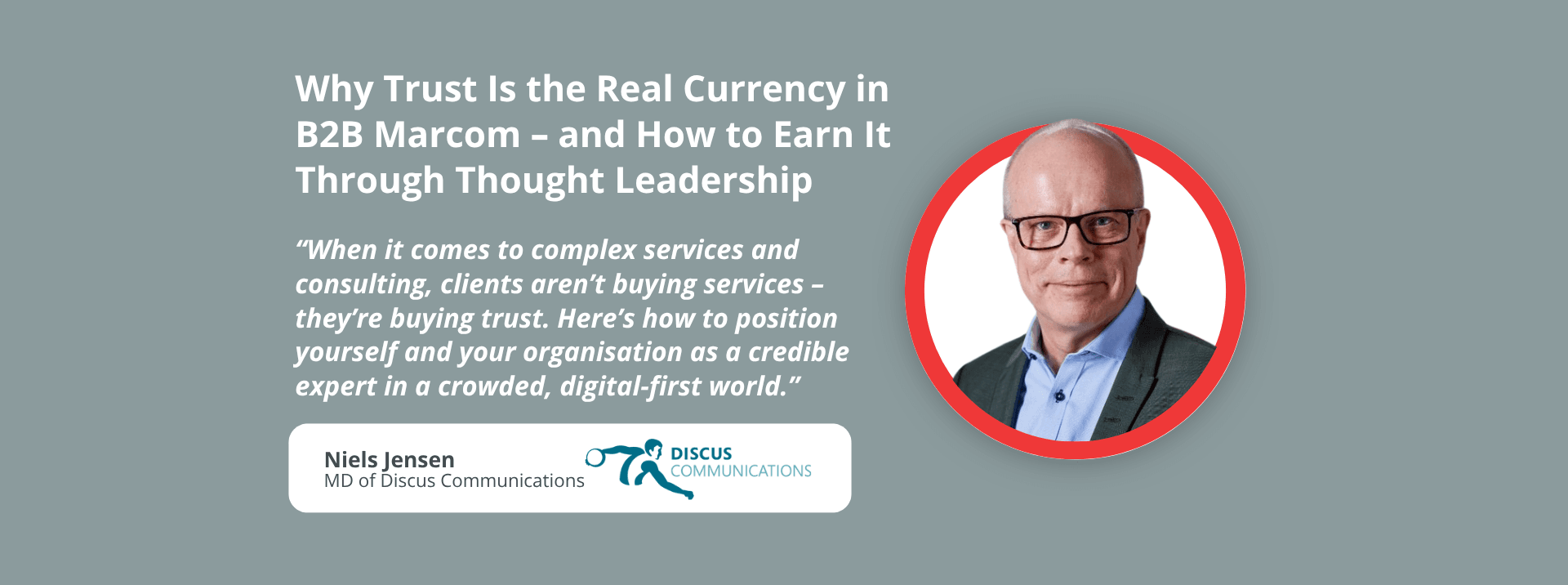When it comes to complex services and consulting, clients aren’t buying services – they’re buying trust. Here’s how to position yourself and your organisation as a credible expert in a crowded, digital-first world.
In today’s information landscape, we are all bombarded with voices competing for our attention. Especially for consulting companies and B2B brands offering complex products and services, this makes genuine thought leadership not just a nice-to-have, but a strategic imperative. Your clients don’t just buy your services or products – they buy trust.
Clients aren’t just looking for a vendor or service provider – they are looking for partners who understand their business challenges, anticipate their needs, and offer credible, forward-thinking insights. The true hallmark of a thought leader is the ability to elevate client conversations from product features to strategic value. This kind of authority can’t be self-declared – it must be consistently demonstrated, strategically communicated, and earned. But how do you get started?
Let’s say you’re a highly skilled consultant or engineer working for a specialised firm. Your clients are happy, your colleagues respect you, but outside your existing network, no one knows who you are. Your insights and knowledge never reach new people who could benefit from them. That’s not just a loss of visibility, but also of opportunity.
Thought Leadership Is Not Just a Buzzword
Many executives aim to be seen as trusted advisors who are strategic, credible, and influential. But very few achieve this position. Why? Because real trust is not built from credentials or clever taglines alone. It is built through visibility, relevance, and repetition. Effective thought leadership means using your expertise to shape conversations consistently – and across communication platforms and channels.
When you do thought leadership right you want to provide original insights, adding perspective, and engaging with your audience in ways that demonstrate your value and expertise. It is also about being brave enough to show up with personality and letting your professional identity extend beyond your job title.
So, if you think this sounds easy – what’s holding people back? Often, it’s the fear of being too visible, of saying the wrong thing, of not being perfect, or of falling short of what they believe others expect of them. But silence doesn’t build trust – engagement does.
What This Means for PR and Communications
For companies aiming to grow internationally, media presence is the perfect business tool. A strategic PR program positions your people as experts in their fields. It opens doors to partnerships, credibility and new markets.
In an age where decision-makers Google you before contacting you, your media footprint matters. Journalists, clients and other stakeholders all take cues from your visibility and your voice. If you’re not part of the conversation, you just might be missing out.
Employee advocacy and thought leadership drive real-world results, whether it is inbound leads, increased trust, or faster sales. Becoming a visible expert means stepping beyond your company’s brand. In sectors with complex services, the relationship between your brand and your people is almost invisible. Here’s what successful professionals do differently:
- Own your voice: Share opinions and insights, not just news or promotions. Don’t be afraid to challenge assumptions or offer a fresh take.
- Be multi-platform: Combine digital presence (LinkedIn, newsletters) with real-world visibility (conferences, podcasts, media contributions). Repetition across channels builds familiarity.
- Show up regularly: You don’t build trust with one LinkedIn post. It’s a long game of repeated relevance. A consistent rhythm of valuable content builds recognition over time.
- Back it with personality: People trust people, not logos. Let your experts be visible. Share behind-the-scenes stories, human perspectives, and what drives your passion.
- Make it easy to share: Great thought leadership travels. When you create useful, media-friendly content, it gets quoted, reposted, and recommended.
- Keep it simple, stupid: Choose one insight, idea, opinion – or even something that’s on your mind.
You don’t need to shout to be heard – but you do need to speak clearly, consistently, and credibly. Because in a world full of noise, trust is built by those who dare to show their face.
Written by: Niels Jensen, MD of Discus Communications.
First published by The Plexus PR Group, of which DUO is a member.
